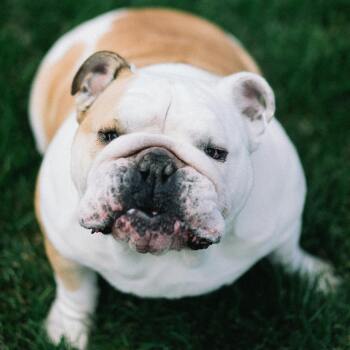English Bulldogs

The English Bulldog: Lovable, Loyal, and Low-Key
Don’t let the sour mug fool you—behind that wrinkled face is one of the sweetest, most devoted companions you’ll ever meet. The English Bulldog is a breed full of charm, character, and couch-loving affection. Equal parts tough and tender, Bulldogs have a way of winning hearts wherever they go.
Why Bulldogs Make Great Pets
- All About Affection: Bulldogs form deep bonds with their families and love nothing more than lounging next to their people.
- Low-Energy, High Love: Not a fan of long hikes? No problem. Bulldogs are calm and content with short strolls and lots of naps.
- Kid-Friendly Nature: Gentle, patient, and protective, Bulldogs are often excellent with children.
- Apartment Approved: Their chill demeanor and low activity level make them great companions in small living spaces.
- Loyal Guardians: Bulldogs may be mellow, but they won’t hesitate to defend their home and family.
Bulldog Quirks to Know
- Snort Central: Those flat faces come with snorts, snores, and some impressive snuffling.
- Drool and Gas Alert: Bulldogs can be a bit… expressive. Keep the wipes and air freshener handy!
- Weight Watchers: Without regular walks and portion control, Bulldogs can pack on the pounds quickly.
- Puppy Zoomies: Young Bulldogs can be rowdy and rambunctious until they mellow with age.
- Possessive Tendencies: They may guard food or toys without proper training and socialization.
A Brief History
The Bulldog’s intimidating appearance once served a brutal purpose—bull-baiting in England. Thankfully, after that practice was banned, the breed was refined for gentleness while keeping its brave heart. Today’s Bulldog is a softie at heart, beloved as a mascot, family dog, and couch companion across the world.
Life with a Bulldog
English Bulldogs generally live 10–12 years. Their sturdy, squat build is part of their charm—but also comes with unique health needs. A Bulldog thrives with regular vet care, a balanced diet, and some light activity to keep joints happy and weight in check.
Common Health Concerns in Bulldogs
- Joint & Bone Health— Bulldogs are prone to hip and elbow dysplasia, which can lead to arthritis and reduced mobility. Growing too quickly can cause osteochondritis dissecans (OCD)—a joint issue requiring surgery in some cases. Regular monitoring and weight management are key to avoiding long-term discomfort.
- Spinal Issues— Hemivertebrae, a congenital spinal deformity, is more common in Bulldogs and may cause pain or coordination problems. X-rays and early intervention can help manage or prevent worsening symptoms.
- Breathing Troubles— That classic Bulldog snore might be cute, but brachycephalic airway syndrome is serious. It affects their breathing and can lead to overheating or even fainting. In severe cases, surgery may be required to improve airflow and quality of life.
- Bladder and Kidney Stones— Bulldogs are at higher risk for developing bladder and kidney stones, which can be painful and dangerous. Signs include straining to urinate or blood in the urine—call your vet immediately if you notice these symptoms.
- Heart Health— Heart murmurs or rhythm abnormalities may appear as Bulldogs age. Routine vet checks can catch early signs of heart disease, allowing for medications and lifestyle changes that extend quality of life.
- Skin Conditions— Bulldogs are prone to skin fold infections, yeast overgrowth, and seborrhea. Regular cleaning of facial folds and vet-approved shampoos help keep skin healthy. Watch for itching, odor, or redness.
- Eye Issues - Bulldogs may deal with:
- Distichiasis (irritating extra lashes)
- Entropion (inward-turning eyelids)
- Dry Eye (lack of tear production)
- Cherry Eye (prolapse of the third eyelid)
Most of these issues are manageable, but many require surgical correction if left untreated.
- Laryngeal Paralysis— This condition affects the vocal cords and makes breathing difficult, especially in heat or during exercise. Noisy breathing or fainting are red flags—talk to your vet right away.
- Cancer— Older Bulldogs are at increased risk for certain cancers. Regular check-ups and keeping an eye out for unusual lumps help with early detection and treatment.
- Dental Problems— Bulldogs can have malocclusions (misaligned bites) or missing teeth. Regular dental care and check-ups are essential, and in some cases, orthodontic care may be recommended.
Final Thoughts
The English Bulldog may be laid-back, but they bring fierce devotion, goofy charm, and quiet companionship into your life. With routine care and a little extra love, these lovable loafs will be snoring happily by your side for years to come.
Ready to Learn More? We’re Here to Help!


